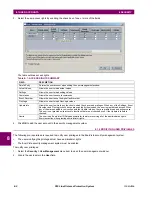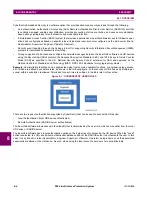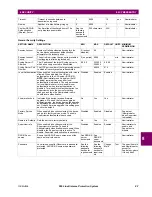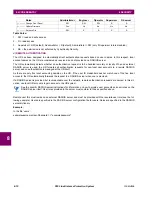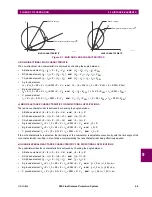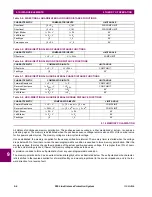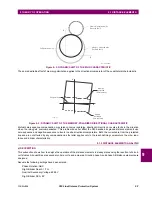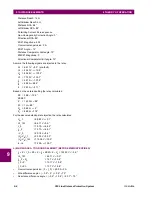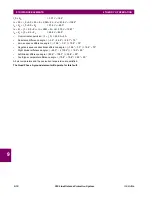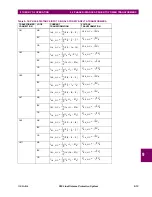
GE Multilin
D30 Line Distance Protection System
9-1
9 THEORY OF OPERATION
9.1 DISTANCE ELEMENTS
9
9 THEORY OF OPERATION 9.1DISTANCE ELEMENTS
9.1.1 INTRODUCTION
The distance elements use memory voltage for polarization. Additional supervising functions – different for ground and
phase distance zones – complement a classical mho characteristic to enhance directional integrity and reach accuracy:
•
To avoid overreaching during resistive faults under heavy pre-fault load conditions, the ground distance elements uti-
lize a load-adaptive (zero-sequence polarized) reactance characteristic to supervise the base mho characteristic.
•
Both negative and zero-sequence currents are compared with the memory voltage to enhance directional integrity of
the ground distance elements.
•
It is well known that ground distance elements – as per the principle of distance relaying – may have limited accuracy
during double-line-to-ground faults. In order to prevent maloperation in such cases the ground elements are blocked by
an extra “fault-type comparator” that utilizes the phase angle between the negative- and zero-sequence currents.
•
The phase distance elements use reactance and memory polarized directional characteristics to supervise the mho
characteristic.
•
Both ground and phase distance elements have the current supervision functions built-in.
The quadrilateral distance characteristic uses the reactance, directional, and current supervising functions as described
above. Right and left blinders adjustable as to both the resistive and angular positions complete the characteristic.
More information regarding the distance characteristics is found in the
Distance characteristics
section. An example of
analysis of the steady-state operation of the distance elements is found in the
Distance elements analysis
section.
The relay provides five zones of distance protection. All zones are identical in terms of settings. However, zone 1 has extra
adaptive mechanisms built-in to enhance the transient reach accuracy even when the voltage signals are supplied from
poor quality voltage sources such as capacitive voltage transformers (CVTs). Ground zones 2 through 5, in turn, have an
extra zero-sequence directional supervision implemented for their time-delayed operation after the memory expires. Con-
sequently, zone 1 is recommended as an underreaching element, and zones 2 through 5 are recommended as overreach-
ing elements and for time-delayed tripping.
The relay uses offset ground directional overcurrent functions as an optional supplement of the ground distance protection
for pilot-aided schemes. The elements are described in more details in the
Ground directional overcurrent
section.
The relay provides for an adaptive distance reach control to cope with the overreaching and sub-synchronous oscillations
when applied to, or in a near vicinity of series compensated lines. More details can be found in the
Application on series
compensated lines
section.
The distance elements use phase angle comparators to shape their characteristics as described in the
Distance character-
istics
section. The voltage and current phasors are estimated using optimized techniques as explained in the next section.
9.1.2 PHASOR ESTIMATION
The relay samples its input AC signals at 64 samples per power system cycle. A fast and accurate frequency tracking
mechanism ensures accurate filtering and phasor estimation during off-nominal frequency conditions.
The phasor estimation process for both currents and voltages is based on the commonly used Fourier algorithm. Due to a
different nature of signal distortions in the current and voltage signals digital pre-filtering algorithms have been, however,
designed and optimized separately for the current and voltage channels.
The current signals are pre-filtered using an improved digital MIMIC filter. The filter removes effectively the DC compo-
nent(s) guaranteeing transient overshoot below 2% regardless of the initial magnitude and time constant of the dc compo-
nent(s). The filter has significantly better frequency response for higher frequencies as compared with a classical MIMIC
filter. This was possible without introducing any significant phase delay thanks to the high sampling rate used by the relay.
The voltage signals are pre-filtered using a special digital filter designed to cope with CVT transients. The patented filter
combines filtering and memory actions enabling the relay to cope with CVT noise under high Source Impedance Ratios
(SIRs). The filter controls underestimation of the fault voltage magnitude to less than 1% of the nominal and prevents cer-
tain phase angle anomalies that can be encountered under heavy CVT noise and high SIRs.
Summary of Contents for D30D00HCHF8AH6AM6BP8BX7A
Page 10: ...x D30 Line Distance Protection System GE Multilin TABLE OF CONTENTS...
Page 374: ...5 248 D30 Line Distance Protection System GE Multilin 5 10 TESTING 5 SETTINGS 5...
Page 398: ...6 24 D30 Line Distance Protection System GE Multilin 6 5 PRODUCT INFORMATION 6 ACTUAL VALUES 6...
Page 410: ...7 12 D30 Line Distance Protection System GE Multilin 7 2 TARGETS 7 COMMANDS AND TARGETS 7...
Page 444: ...9 24 D30 Line Distance Protection System GE Multilin 9 5 FAULT LOCATOR 9 THEORY OF OPERATION 9...
Page 576: ...B 102 D30 Line Distance Protection System GE Multilin B 4 MEMORY MAPPING APPENDIX B B...
Page 616: ...D 10 D30 Line Distance Protection System GE Multilin D 1 IEC 60870 5 104 PROTOCOL APPENDIX D D...
Page 628: ...E 12 D30 Line Distance Protection System GE Multilin E 2 DNP POINT LISTS APPENDIX E E...
Page 636: ...F 8 D30 Line Distance Protection System GE Multilin F 3 WARRANTY APPENDIX F F...
Page 646: ...x D30 Line Distance Protection System GE Multilin INDEX...






